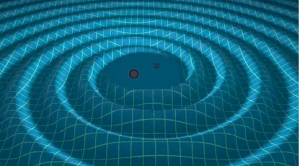
By Michael Irving
Professor Richard Muller has put forward a theory that the progression of time is a direct result of the expansion of space(Credit: UC Berkeley)
In day-to-day human experience, the march of time is constant. Outside the adventures of Marty McFly or Bill and Ted, most people wouldn’t normally wonder how time works, but the question of why it moves forwards, has long been on the minds of physicists and philosophers. Now, a professor at UC Berkeley has a new theory: as the universe expands, it drives the expansion of time, which creates a constant series of new “now” moments.
The idea of space and time being intrinsically linked forms the basis of Professor Richard Muller’s new theory. Since the moment of the Big Bang approximately 13.8 billion years ago, the universe has been constantly expanding. This doesn’t mean that objects in space are drifting apart, but rather, the fabric of spacetime itself, in which objects are embedded, is expanding. Muller’s idea is that as new space is created, so is new time, and this constant expansion is what we experience as the progression of time.
“Every moment, the universe gets a little bigger, and there is a little more time, and it is this leading edge of time that we refer to as ‘now’,” says Muller. “The future does not yet exist … it is being created. ‘Now’ is at the boundary, the shock front, the new time that is coming from nothing, the leading edge of time.”
That’s bad news for time travel hopefuls. In practical terms, Muller says that we couldn’t travel into the future (except at our current rate of one second per second) because it simply doesn’t exist yet, and going backwards would require an associated decrease in the amount of space – it is possible for the amount of space in the universe to decrease due to cataclysmic cosmic events like a black hole disappearing, but only on an immeasurably small scale.
Accepted thinking for the one-way “arrow of time” goes back to Arthur Eddington, who worked closely with Einstein. He suggested in 1927 that time flows in the direction of increasing disorder, or entropy. But Muller argues that human activity is actually decreasing entropy on a local scale, and yet time continues to march forward.
“The idea that the arrow of time is set by entropy does not make any predictions, it is simply a statement of a correlation,” says Muller. “And to claim it is causation makes no sense.”
Muller believes that in future, his theory could be tested with LIGO, the observatory that detected gravitational waves for the first time back in February. These waves were caused by two black holes merging into one. In doing so, they created new space and, according to Muller’s calculations, the event should also have produced about one millisecond of new time. If LIGO observes another event, occurring at around a third of the distance of the previous one, the discovery of a potential one-millisecond delay could support his theory.
So what does the idea mean for us? Not a lot, in practical terms, since the observable effects are likely to be so tiny that only instruments like LIGO could detect them.
“I think my theory is going to have an impact on calculations of the very early universe,” says Muller. “I don’t see any way that it affects our everyday lives. But it is fascinating.”
Muller has just published a book on the theory, titled Now: The Physics of Time. He explains the idea in the video below.
